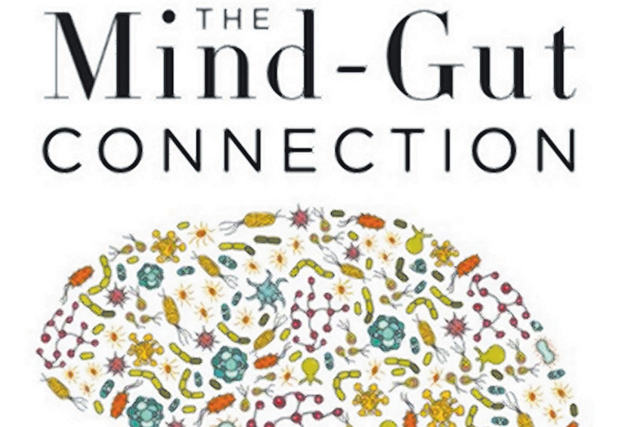Your brain and your gut may be trying to tell you something
Butterflies when you’re nervous. The dull pain in the pit of the stomach when you’re depressed. The need to find a bathroom really fast when you see something that makes you queasy.
All offer intuitive evidence that how we feel and what’s going on in our heads can affect what’s going on in our gastrointestinal system. But research increasingly is showing that the conversation between the brain and the gut is more of a dialogue than a monologue, and that the microorganisms that live in the gut may communicate with the brain.
And, because of that, what happens in the gut can affect what’s going on in the rest of the body, down, perhaps, to how we feel.
“I think we’ve always had the thought of the mind having (an effect on) the gastrointestinal tract, and you see that all the time,” says Dr. Frank Nemec, a Las Vegas gastroenterologist. That can be illustrated by, for example, “a seasoned police officer who comes to a gruesome scene and starts to vomit.”
What wasn’t understood until relatively recently, however, is the influence of the gut on the brain, Nemec says. “And we’re just starting to scratch the surface of this.”
Research indicates that the trillions of microorganisms that live in the gut (the large and small intestines) communicate with the brain through a system of nerve cells in the gut. Through this network, the microorganisms in the gut may be associated with systemic effects — inflammation, for example — that can occur throughout the body.
In fact, Nemec says, “we think there may be a number of metabolic, cardiovascular and central nervous system manifestations of changing the gastrointestinal microbiome.”
Dr. Daliah Wachs, a family medicine physician, host of a national radio show and an assistant professor at Touro University Nevada College of Osteopathic Medicine, says recent research demonstrates the complex community of microorganisms that live in the gut.
Wachs notes that some people long have maintained that, for example, eating a high-carb diet makes them feel depressed and eating sugary foods makes them feel anxious. Now, she says, research points to a dialogue between the brain and the gut, in which processes carried out by microbes in the gut can affect the rest of the body.
Researchers long have studied the flora that inhabit the gut and the connection between the brain and the gut. What’s new is the role of the microbiota in that conversation, says Dr. Emeran Mayer, executive director of the Oppenheimer Center for Neurobiology of Stress and Resilience, co-director of the Digestive Diseases Research Center at UCLA and author of “The Mind-Gut Connection: How the Hidden Conversation Within Our Bodies Impacts Our Mood, Our Choices, and Our Overall Health.”
Dr. Mara Posner, a gastroenterologist with Southwest Medical Associates, says most of the patients she sees have conditions in which the brain, usually reacting to stressors, causes problems in the gut. “It’s the brain talking to other organs as opposed to the reverse,” she says.
But, she adds, an imbalance of microorganisms in the gut also can cause problems. For example, “there is an entity where there’s an overpopulation of gut flora, or what we call small intestinal bacterial overgrowth, which can cause inflammatory symptoms including bloating, diarrhea or abdominal pain.”
Research hints that what happens in the gut may even affect emotions. However, Nemec cautions that “the research on this is brand new. We need to get more data before we can make the connection about things like depression or mania or euphoria.”
What we eat can affect the health and presence of the microorganisms that live in our gut. High-fat and high-sugar diets, for example, can cause the microorganisms in the gut to evolve in a way that may cause them to have negative effects on the body, Mayer says.
Similarly, Nemec says highly processed foods and foods that contain antibiotics or hormones also can affect the gut flora in adverse ways.
Of course, the holiday season is just the time when Americans tend to overdose on sugary, high-fat, rich foods. To keep the gut and its inhabitants in good shape, Wachs suggests that we “listen to the body and feed it good food. So fruits and vegetables, you can’t go wrong. Watch sugar load, but make sure you get fruits and vegetables.”
Probiotics — over the counter preparations that improve upon the diversity of gut flora — also can help to restore or improve the state of gut health. But, Wachs says, “we are not at this point recommending that people take probiotics. There’s really not a lot of (product) oversight. But eat yogurt and fruits and vegetables and make sure you have a balanced diet.”
Mayer says the “two main offending items in the North American diet are the high-animal fat and the big sugar content.” Try, he says, to increase consumption of plant-based foods and “pretty much eliminate sugar.”
In addition, Mayer says stress relaxation techniques — for example, mindfulness practices — and regular aerobic exercise can help to maintain a healthy gut.
Read more from John Przybys at reviewjournal.com. Contact him at jprzybys@reviewjournal.com and follow @JJPrzybys on Twitter.



















